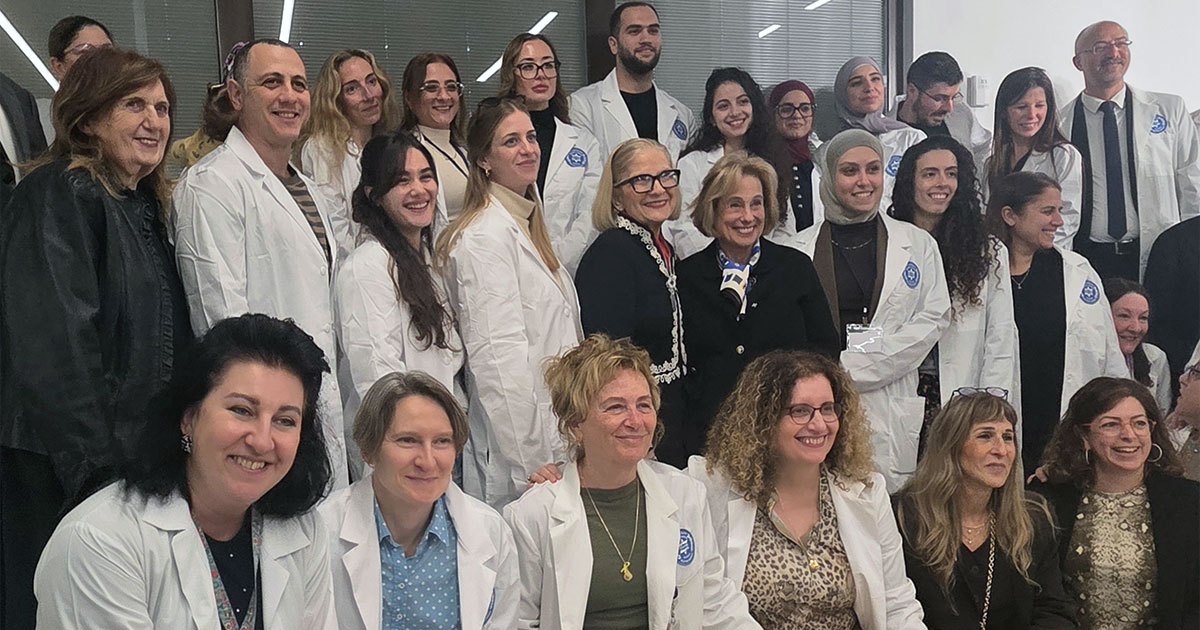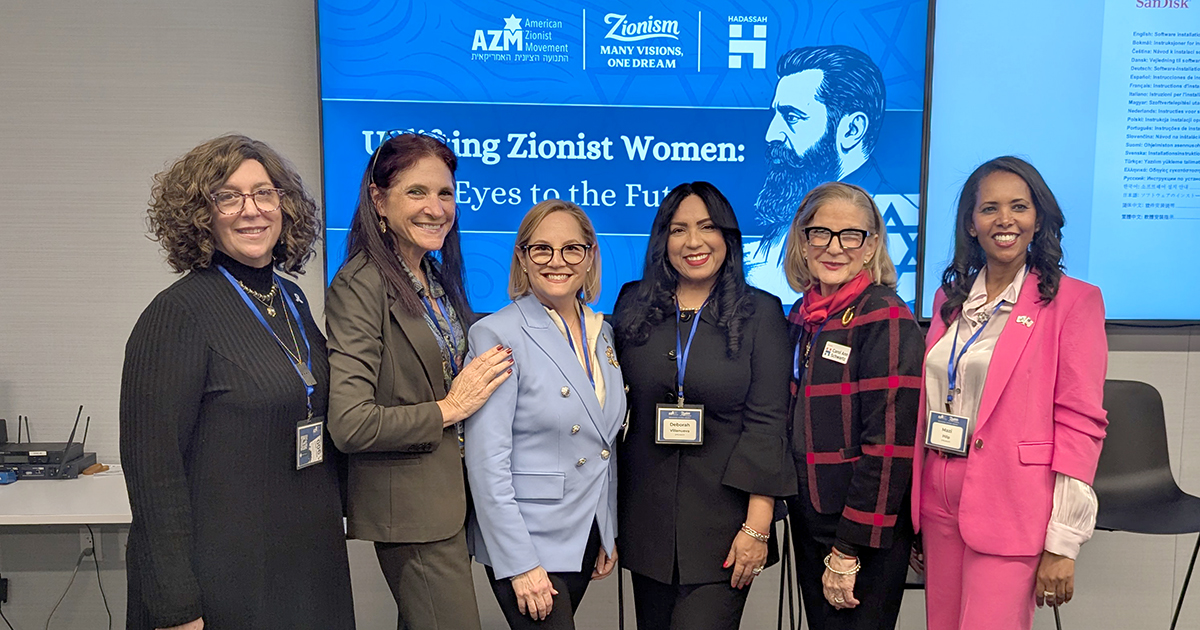Excerpted and translated from the March 5 article in Makor Rishon by Ricki Rat
Dr. Tamar Elram couldn’t have predicted the task she faced during the past year: In the midst of a global pandemic, she was charged with ensuring that Hadassah Hospital Mount Scopus, where she is the director, would remain free of COVID-19. Three lockdowns later, she talks of the tough dilemmas during these days of illness, of the poetry book she managed to compose between management meetings on Zoom and patient admissions, and of the path that needs laying out for other women.
For almost a year, the Elram family home in the community of Alon remained free of COVID-19. But then the son who serves in the Israel Defense Forces managed to pass it on to his three siblings. “I had four children with COVID-19 at home,” she relates. “The eldest girl, who doesn’t live with us anymore, had already contracted COVID-19. I was already vaccinated but I was still concerned that maybe my husband and I would catch it. Meanwhile, the kids weren’t feeling well, one even fainted and the youngest was running a high temperature. I found myself lying next to her in the middle of the night praying ‘Please don’t let me be infected.’ ”
It seems that the vaccination worked: Dr. Elram’s test was negative.
“I didn’t need to isolate, but it was obvious that I was staying home to care for the children. The hospital has an excellent administrative system, and no one was going to panic because I was not there. A good manager is measured by her ability to manage from afar, and everything ran extremely smoothly. Thankfully, after 48 hours, everyone felt well again, the house became a youth club and I could happily return to the hospital.”
Dr. Elram explains, “From the outset, my main fear was an outbreak in the Geriatric Rehabilitation Department. We are currently building a large and beautiful rehab center, but, right now, we are using a department constructed 50 years ago in which there are four to five patients per room.”
She adds, “From the start, we established incredibly stringent practices –only one visitor and full protection the entire time. We’ve not been vaccinating inpatients, but, in this department, we did.”
In receiving Emunah’s 2021 Woman of the Year award, Dr. Elram comments that she is not the woman of the year. She is a combination of the many people and happenings that shaped her life. She explains, “I am a young 27-year-old mother who leaves the house silently on a Shabbat morning so as not to wake the kids on my way to a shift in the maternity ward. I’m a 38-year-old doctor who sees her own helplessness when a two-day-old baby dies in a tent camp in Haiti after the earth literally shook there. I am not ‘woman of the year.’ I am women of the year. I am my grandmothers. I am my parents, who taught me responsibility. I am my friends, who teach me courage. I am my partner, who teaches me to listen. I am my children, who teach me to give and receive love. I am my patients, who teach me humility.”
Dr. Elram says, “It’s against my nature to sit here and be interviewed, not because I am shy, but because I see this publicness as the reverse of humility. I’m here because I want people to know of the work at the hospital. More important, I want to inspire other women. Even that sounds arrogant. Many women try to lay out their path. Thankfully, God gave me the wherewithal, as did my family, and I’ve reached a position from where I can help. We can all be women of the year, each of us for someone else.”
Dr. Elram, age 49, was born in England. She moved to Israel with her family when she was 5 years old and grew up in Jerusalem. Dr. Elram knew she’d be a doctor from an early age. She studied medicine at the Hadassah-Hebrew University School of Medicine and specialized in gynecology. And then she failed her exam.
“I felt ashamed in front of my children and the department head. The next day, I woke up depressed and it was really difficult to get out of bed and go to the hospital. With time, I’ve come to realize it was something of a gift for me and those around me. I wish all doctors to fail just one time in something that’s important to them. This, too, teaches us humility and that there’s no success without failure along the way. By the way, the next time I sat for the exam, I passed with distinction.”
Today, Dr. Elram reports, 50 percent of gynecology students are women. “There is a revolution in process. And rightly so,” she says.
Before becoming director of Hadassah Mount Scopus in November 2017, Dr. Elram was a senior doctor at Hadassah Hospital Ein Kerem, deputy director of the hospital and a lecturer in the adjoining medical school, the assistant to the Health Ministry director general and the deputy head doctor for the Meuhedet health fund in Jerusalem. She also attained a master’s degree in medical administration at Harvard University. From 2015–2017, she managed Jerusalem’s Misgav Ladach Hospital.
“For me, Hadassah is home,” Dr. Elram says. “Even when I was in administrative positions elsewhere, I always felt the draw and knew I would return.”
For Dr. Elram, it is “an awesome privilege to manage a hospital at this time.” In general, she doesn’t like standing still. “I love taking on challenging administrative roles,” she says, “to push forward building projects, create work procedures and change organizational culture. Whoever comes to Hadassah Mount Scopus today sees cranes and construction workers on the ground for the first time in decades.”
Dr. Elram reports that, in addition to the expanded rehabilitation center, there’ll be a new emergency medicine center and a new 14-story inpatient building. “I was excited when we opened our new maternity rooms, the catheterization laboratory, the heart rehabilitation center, the oncology daycare unit and the trauma unit,” Dr. Elram reports. And, she adds, “We’ll be dedicating our new pediatric emergency room next week and a new maternity ward in a few months. We’re in a historic period, building Jerusalem anew and realizing a 2,000-year-old vision.”
Besides overseeing all this construction, Dr. Elram writes poetry. In a Doctor’s Handwriting, a collection of her selected works, will be published soon. Some of her writing is connected to her profession, some to women and motherhood.
In commenting on the various awards she has received, Dr. Elram noted, “I get frustrated when I’m chosen for one list or another of ‘leading women.’ I’m waiting for the day when we don’t need lists like this but rather have just one list of leaders. I think the split is somewhat chauvinistic, but I understand it is part of the corrective process, and, one day, it will be passé.”



.svg)





